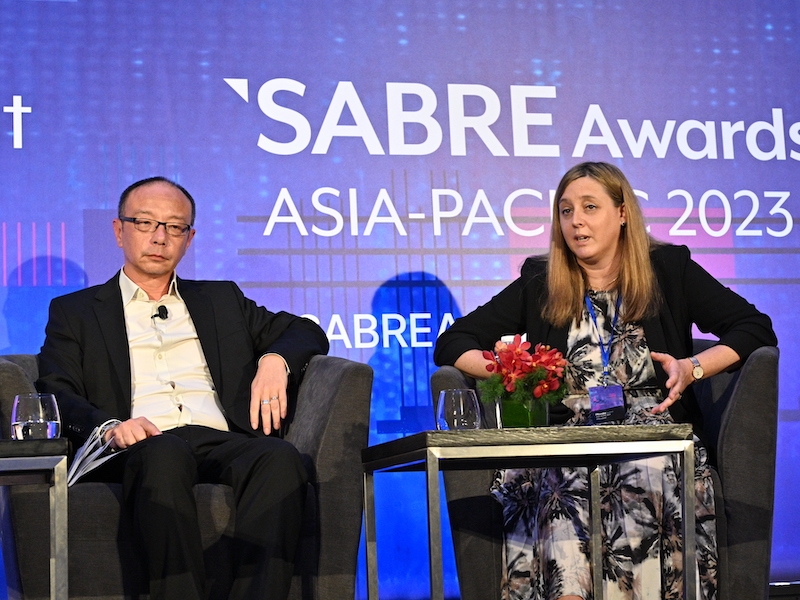Maja Pawinska Sims 02 Oct 2023 // 3:39PM GMT

SINGAPORE — In a conversation at PRovoke Media’s Asia Pacific summit last week, speakers acknowledged there were challenges in measuring corporate reputation, but said bespoke, sophisticated approaches – including taking local and cultural nuances into account – could more closely link reputation capital with business value.
Kelly Johnston, Sandpiper’s COO and general manager for Southeast Asia (pictured, right), said: “Reputation measurement is an area that is fraught with challenges that we all struggle with. It’s a perennial problem – but it is so important."
Johnston highlighted the industry’s tendency to rely on static, one-time surveys that lack broader industry context. She urged a shift towards more forward-looking insights to inform strategic decisions, adding: “Insights can be too backward-looking – it’s great to know where you’ve come from, but what we all need are forward-looking insights that enable us to make better decisions looking forward.”
She also pointed out the common disconnect between global headquarters and regional dynamics, underscoring the need for more locally-tailored approaches, and stressed the importance of integrating social and digital tools into measurement strategies: “Real actionable insights can be hard to find. Measurement approaches often don’t integrate well with more day-to-day tools such as social and digital – they need to work together for reputation measurement to properly power reputation management.”
Johnston added: “Reputation should be viewed as an investment, akin to capital, with a focus on growth and value.” She advocated a bespoke approach that considers a company's unique challenges, embraces diversity - including cultural differences – and incorporates social listening tools: “Our belief is that acknowledging the complexity is the first step to effective reputation measurement and management.”
Sandpiper’s MD of research and insights Craig Young (pictured, left) echoed Johnston's sentiments, highlighting the data-rich environment today's businesses operate in. “Clients now have massive amounts of data and it’s easy to forget how data-rich an environment we’re in. The challenge now is using data effectively to help clients maintain and build reputation capital.”
In addressing the specific challenges of the Asia-Pacific market, Young also emphasised the impact of cultural nuances on reputation measurement, and the critical role of local market knowledge and listening to on-the-ground experts with real understanding of their clients' businesses: “Some of the factors include cultural differences – it’s often surprising to me how challenging it can be to get global headquarters in the US or the UK to understand the cultural and linguistic diversity in Asia Pacific.”
Sandpiper's approach to measuring reputation capital has centred on the development of research involving over 6,000 participants, providing a database of reputation scores that can be continually updated. Young underlined the need to interpret these scores in the context of individual markets.
“Why is a database of reputation scores so important? In the Philippines, almost two-thirds of respondents say any factor is important in driving overall reputation, but in Japan it’s only 22%," he said. "So if you find out that 50% of people in a market say that a company’s stance on environmental issues, for example, is critical to driving perception of their reputation, is that an important result or not?
“It depends on which market you’re talking about – it would be an incredibly high score in Japan and you would want to focus on that issue, but the same score in the Philippines would make it a second-tier issue. Those nuances are critical to understand.”
Young added that even taking away bias and cultural differences, there remain significant differences in drivers of overall reputation by market: “In the Philippines, the general public are the most positive, easiest market in surveys, while in Japan they tend to be tougher. In the Philippines, everything is important, but the ranked priorities are different – for example governance is not in the top three issues, whereas in Japan it most certainly is.
“In Japan, governance is actually a more important driver of reputation than it is in the Philippines, even though only 27% say it’s important in Japan compared to 72% in the Philippines. If you just look at data, you would end up making serious misinterpretations of what that’s telling you.”
Young highlighted a case study of a US university seeking to attract more students from Asia. The research revealed that, for Asian students looking to study in the US, creativity and innovation emerged as the paramount driver of their perception of educational institutions, but this was the area of reputation the university scored lowest on. Young said: “It was an ‘aha!’ moment, and a golden opportunity to develop thought leadership to reposition the university in that space.”
Johnston said embracing this kind of complexity was the cornerstone of effective reputation measurement and management. She urged business and reputation leaders to move beyond oversimplified approaches and invest in continual research to drive informed business strategies: “It’s a complex area that needs complex thinking. The insights to action gap results largely from attempts to oversimplify.”
She also said she was encouraged that Sandpiper had received a growing number of reputation capital research briefs over the past five years: “While initially it can be a daunting step to decide to invest in research – including more bespoke local research – if that battle can be won, it’s plain sailing from there.”



































.jpg)

















